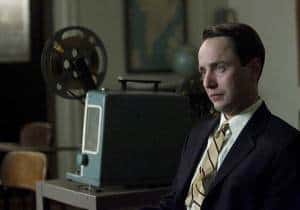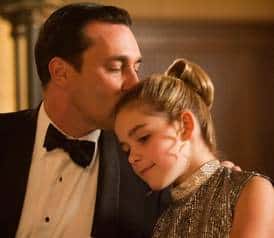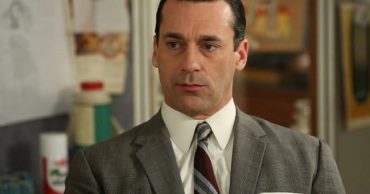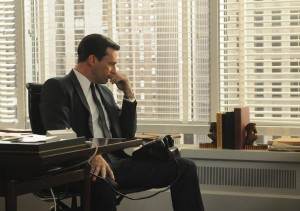
“I’ll keep watching these films of Don’s wedding night until I figure out ALL of his moves.”
I like Pete Campbell. I don’t know why.
If I met a guy like him, and I’m sure that I have, I’d have to stifle an urge to punch him in the softest part of his smug face (in my imagination, I am terribly brave but also concerned with the bruising of my knuckles). But in the context of Mad Men, I can’t bring myself to hate him.
Much of it comes down to the fine casting. Vincent Kartheiser has a boyish physicality that is perfectly suited to Pete Campbell: no matter what sharky office politics move he orchestrates, or how many inappropriately young women he leers at in a driving instruction class*, Pete always looks like a guy playing dress up in his dad’s clothes.
This was true even before his father’s death in season 2 (‘Flight 1’) but has become even more tragic as his success outstrips his own self-worth. Much of this season has seen Pete’s life drawn in lines very similar to that of Don’s in the early seasons, from the architecture of his suburban house to the train-ride into the city that provides far too much time for corrosive rumination. No matter how many trophies of success Pete hunts down, he looks like a kid caught in a grown-up’s world (at least until he can fill out a sports coat).
Interesting about ‘Signal 30′(directed by John Slattery who provides a sure hand that continues season five’s upward swing and carves out a career as a filmmaker in his own right) is the nakedness with which Pete is striving for Don’s approval. We know that Pete and Trudy are perfectly suited avaricious team, apparently cut from the same sly manipulative cloth, but the directness with which Trudy traps Don and Megan into attending a Saturday night dinner would be upsetting if not delivered with Alison Brie’s unerringly sunny demeanour (which feels about three degrees back from flat-out sociopathic behaviour).
If not for the psychological groundwork laid over the previous seasons, Pete’s apparent fawning over Don (right down to fellow dinner guest Ken Cosgrove reporting that Don is guaranteed ‘the biggest steak’, much to Don’s own embarrassment) might have felt too jarring from the Pete we’ve seen so far in season five, a guy who skulks through the underbrush of corporate game hunting with confidence and rock-steady instinct. But what looked in season one like Pete aiming for Don’s job has now become a young man taking a bead on another man’s life; and we sympathized with Don and his wrestling matches, both existential and extra-marital. We’re quick to snipe at Pete for behaviour that is rarely on par with Don’s flaws, and why–because Don is so handsome and charming?
I can’t help but feel bad for this fine young cannibal, if not just for the deep sadness Pete feels at the emptiness of ‘having it all’, then at least for the poor schlub losing a fist fight to an older man. A British older man at that.
I have found it peculiar that, as much as fans seem to relish in hating Pete, much of the online scuttlebutt has revolved around Pete’s psychological slide and a possible suicidal end (dramatically, it makes sense: even the dullest playwright knows that you don’t introduce a gun in the first act unless you plan on using it in the third, and Pete’s had that rifle in his office for a mighty long time). As much as I can’t hate Pete, I am more worried for Don. Here is a guy who has been through countless sexual escapades while married to his first wife. Now he’s on his second martial kick and looks like he genuinely believes this is the real thing. I’m not cynical–I can’t be the only viewer who thought Don’s fidelity to Megan was merely an attempt for him to stay on the monogamy wagon. In ‘Signal 30’, he is adamant that his marriage to Megan is for good. After entertaining a client at a swinging whore house (do those only happen in movies or just in Manhattan?), a chaste Don has to deal with a disheveled, disillusioned Pete. Even Don feels bad for the kid, taking Pete’s pre-emptive jabs at the older man’s high moral ground (‘This is rich…coming from a man who just pulled his pants up on the world’) by saying that his actions while married to Betty were somehow justified because he was miserable. Don tries to advise Pete not to throw away his life with Trudy (‘…if I’d met her first, I’d have known not to throw it away’).
An admirable sentiment–and you could make the case that Megan is Don’s equal in almost every way that Betty was not. Megan refuses to do Don’s bidding when trying to wriggle out of the Campbell’s dinner party and instructs him on what coat to wear to the engagement. But what if their marriage isn’t for keeps? Megan is a young woman and statistics are not in their favour–considering the survival rate of age-discordant couples, second marriages and workplace relationships, put that into a cauldron and you have one potentially toxic stew (the only kind of dish you should make in a cauldron, by the way).
What if the marriage fails? Hell may hath no fury like a woman scorned, but consider the swath of destruction in the offing by a spurned former Lothario. An unhinged Don might lay waste to a willing female population, the kind that could combine a mess like Richard Speck and Charles Whitman in the prequel to Looking for Mr. Goodbar that nobody requested.
*Pete doesn’t drive! That’s why I like the jerk–growing up in a large city, neither of us ever felt the need to get a license.
Like what you’ve read? Sure you did! Jump over to Amazon to get my book Kings of Madison Avenue: The Unofficial Guide to Mad Men
And you can always find me at jessemclean.ca or on twitter @kungfugripe
 Follow Us
Follow Us





